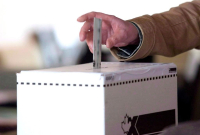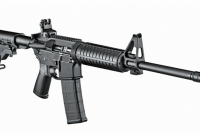Support strong Canadian climate journalism for 2025
Justin Trudeau says he'll welcome amendments from opposition parties to his government's proposed reforms to laws governing federal political parties and elections.
The prime minister stressed his openness to amendments to Bill C-76 in response to Conservative demands Tuesday that government advertising and ministerial spending announcements and travel be banned during the three months preceding an election call.
And he did it again in response to Conservative Leader Andrew Scheer's contention that the bill will do nothing to prevent advocacy groups from using foreign money to influence the outcome of elections.
But Scheer questioned Trudeau's sincerity, asserting that the prime minister "ordered" Elections Canada to implement the changes in the bill, introduced earlier this month, before it had received "one word of debate or one vote."
"If that is not trying to rig the rules in his favour, I do not know what is," he charged, accusing Trudeau of "ignoring Parliament and trying to ram through his preferred electoral system changes."
New Democrat MP Nathan Cullen, meanwhile, accused the government of "bullying" opposition parties by threatening to cut short debate on the bill.
Bill C-76 is an omnibus bill that would reverse a number of changes wrought by the previous Conservative administration's widely denounced Fair Elections Act, including restoring the use of voter information cards as a valid form of identification and doing away with measures that critics argued were designed to benefit the deep-pocketed Conservatives.
Among other things, the bill would limit spending by parties and advocacy groups during the three-month period before an election is officially called.
But unless government spending announcements, ads and ministerial travel are banned at the same time, Scheer contended the bill will benefit the ruling Liberals and harm opposition rivals.
"What he is doing is limiting the ability of opposition parties to engage with Canadians while refusing to apply those same restrictions to his own government," he said.
Trudeau responded by taking repeated jabs at the way in which the Harper government rammed through the Fair Elections Act, over the strenuous objections of opposition parties, the chief electoral officer and most electoral experts. And he insisted his government will be different.
"We encourage members opposite to come forward with amendments and proposals because, unlike them when they were in power, we are open to suggestions on how to improve Canadian democracy," he said.
On the issue of foreign-funded advocacy groups, Trudeau said he looks forward to "reasoned amendments and thoughtful proposals" from opposition MPs.
But he noted it was the Harper Conservatives who branded environmental groups as "eco-terrorists and tried to limit their capacity to vote and to be heard in our public sphere." Unlike them, he said: "We believe in the freedom of speech."
However, the NDP accused Trudeau of adopting the same approach to election law reform as the Harper government he once vilified. The Liberals are threatening to impose time allocation to cut short debate on C-76 and did not consult opposition parties on the bill's contents or on the nomination of Stephane Perrault as the new chief electoral officer.
"Why will the Liberals not work with us rather than bullying us?" said Cullen. "Surely, Stephen Harper is not the standard."
Having done little to advance the election law reforms during its first two years in office, the government is now rushing to get C-76 passed in time to be implemented for the next election in October 2019.
Government House leader Bardish Chagger argued that extensive debate is unnecessary because 85 per cent of the bill involves measures recommended by Elections Canada and by the procedure and House affairs committee.
Perrault, who has been filling in as acting chief electoral officer for 18 months, had warned last month that time was running out to implement major changes before the 2019 election. But he told the committee Tuesday that the measures in C-76 can be in place by then because Elections Canada is already preparing plans to implement the bill.
"What we are doing, which is somewhat unusual, is that we will start preparations towards implementation, anticipating (the bill's) passage, adjusting as required" if the bill is amended or defeated, he said.





Comments